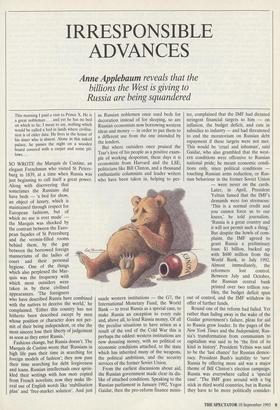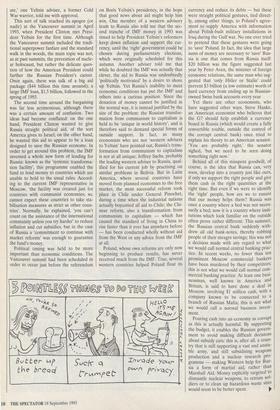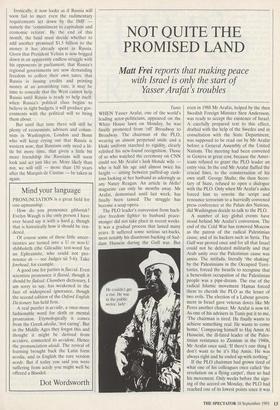IRRESPONSIBLE ADVANCES
billions the West is giving to Russia are being squandered
This morning I paid a visit to Prince X. He is a great nobleman ... and yet he has no bed on which to lie; I mean to say, nothing which would be called a bed in lands where civilisa- tion is of older date. He lives in the house of his sister who is absent. Alone in this naked palace, he passes the night on a wooden board covered with a carpet and some pil- lows...
Fashions change, but Russia doesn't. The Marquis de Custine wrote that 'Russians in high life pass their time in searching for foreign models of fashion'; they now pass their time searching for debt forgiveness and loans. Russian intellectuals once sprin- kled their writings with bon mots copied from French novelists; now they make lib- eral use of English words like 'stabilisation plan' and 'free-market solution'. And just as Russian noblemen once used beds for decoration instead of for sleeping, so are Russian economists now borrowing western ideas and money — in order to put them to a different use from the one intended by the lenders.
But where outsiders once praised the Tsar's love of his people as a positive exam- ple of working despotism, these days it is economists from Harvard and the LSE, politicians like Bill Clinton, and a thousand enthusiastic columnists and leader writers who have been taken in, helping to per- suade western institutions — the G7, the International Monetary Fund, the World Bank — to treat Russia as a special case, to make Russia an exception to every rule and, above all, to lend Russia money. Of all the peculiar situations to have arisen as a result of the end of the Cold War this is perhaps the oddest: western institutions are now donating money, with no political or economic conditions attached, to the state which has inherited many of the weapons, the political ambitions, and the security services of the former Soviet Union.
From the earliest discussions about aid, the Russian government made clear its dis- like of attached conditions. Speaking to the Russian parliament in January 1992, Yegor Gaidar, then the pro-reform finance minis- reformers lost control. Between July and October, the Russian central bank printed over two trillion rou- bles, the budget deficit spun out of control, and the IMF withdrew its offer of further funds.
Round one of the reform had failed. Yet rather than fading away in the wake of the Gaidar government's failure, pleas for aid to Russia grew louder. In the pages of the New York Times and the Independent, Rus- sia's transformation from communism to capitalism was said to be 'the first of its kind in history'. President Yeltsin was said to be the 'last chance' for Russian democ- racy. President Bush's inability to 'save' Russia by offering more aid was a major theme of Bill Clinton's election campaign. Russia was everywhere called a 'special case'. 'The IMF goes around with a big stick in third world countries, but in Russia they have to be more politically consider-
ate,' one Yeltsin adviser, a former Cold War warrior, told me with approval.
This sort of talk reached its apogee (or nadir) at the Vancouver summit in April 1993, when President Clinton met Presi- dent Yeltsin for the first time. Although the Vancouver summit included the tradi- tional superpower fanfare and the standard walk in the woods, the main topic was not, as at past summits, the prevention of nucle- ar holocaust, but rather the delicate ques- tion of how the American President could further the Russian President's career. Once again, there was talk of a big aid package ($44 billion this time around); a large IMF loan, $1.5 billion, followed in the spring of 1993.
The second time around the bargaining was far less acrimonious, although there was a certain amount of confusion. Two ideas had become conflated: on the one hand, President Clinton wanted to give Russia straight political aid, of the sort America gives to Israel; on the other hand, he wanted this aid to appear to be a loan designed to save the Russian economy. In order to get around this problem, the IMF invented a whole new form of lending for Russia: known as the 'systemic transforma- tion facility', this programme enabled the fund to lend money to countries which are unable to hold to the usual rules. Accord- ing to the current IMF representative in Moscow, 'the facility was created just for countries with communist economies; we cannot expect these countries to take sta- bilisation measures as strict as other coun- tries'. Normally, he explained, 'you can't count on the assistance of the international community unless you try harder' to reduce inflation and cut subsidies, but in the case of Russia a 'commitment to continue with market reforms' was enough to guarantee the fund's money.
Political timing was held to be more important than economic conditions. The Vancouver summit had been scheduled in order to occur just before the referendum on Boris Yeltsin's presidency, in the hope that good news about aid might help him win. One member of a western advisory team to Russia also told me that the sec- ond tranche of IMF money in 1993 was timed to help President Yeltsin's reformers keep down inflation and support the cur- rency, until the 'right' government could be chosen during parliamentary elections, which were originally scheduled for this autumn. Another adviser told me that while he doubted the IMF was actually that clever, the aid to Russia was undoubtedly `politically motivated' by a desire to shore up Yeltsin. Yet Russia's inability to meet economic conditions has put the IMF and others into a curious position. Since the donation of money cannot be justified in the normal way, it is instead justified by the size of the problem: the Russian transfor- mation from communism to capitalism is held to be 'unique in world history', and is therefore said to demand special forms of outside support. In fact, as many economists who are not 'western advisers to Yeltsin' have pointed out, Russia's trans- formation from communism to capitalism is not at all unique; Jeffrey Sachs, probably the leading western adviser to Russia, qual- ified for his current job by practising on similar problems in Bolivia. But in Latin America, where several countries have moved from planned economies to the free market, the most successful reform took place in Chile under General Pinochet, during a time when the industrial nations actually boycotted all aid to Chile; the Chi- nese reform, also a transformation from communism to capitalism — which has caused the standard of living in China to rise faster than it ever has anywhere before — has been conducted wholly without aid from the West or any advice from the IMF at all.
Poland, whose own reforms are only now beginning to produce results, has never received much from the IMF. True, several western countries helped Poland float its currency and reduce its debts — but these were straight political gestures, tied direct- ly, among other things, to Poland's agree- ment to supply America with information about Polish-built military installations in Iraq during the Gulf war. No one ever tried to pretend that these gestures were going to 'save' Poland. In fact, the idea that large sums of money are necessary to 'save' Rus- sia is one that comes from Russia itself: $20 billion was the figure suggested last year by Peter Aven, the minister of foreign economic relations, the same man who sug- gested that 'only Hitler or Stalin' could prevent $3 billion (a low estimate) worth of hard currency from ending up in Russian- owned Swiss bank accounts every year Yet there are other economists, who have suggested other ways. Steve Hanke, an American economist who believes that the G7 should help establish a currency board in Russia (which would create a fully convertible rouble, outside the control of the corrupt central bank) once tried to explain his theory to an American senator. `You are probably right,' the senator sighed, 'but we need to be seen doing something right now.'
Behind all of this misspent goodwill, of course, is the idea that Russia can, very soon, develop into a country just like ours, if only we support the right people and give them cash in the right quantities at the right time. But even if we were to identify the 'right' people, how are we to ensure that our money helps them? Russia was once a country where a bed was not neces- sarily a bed; now it is a country where insti- tutions which look familiar on the outside often prove rather different. This summer, the Russian central bank suddenly with- drew all old bank-notes, thereby robbing people of their meagre savings; this was not a decision made with any regard to what we would call normal central banking prac- tice. In recent weeks, no fewer than ten prominent Moscow commercial bankers have been murdered by their competitors; this is not what we would call normal com- mercial banking practice. At least one busi- nessman, well known in America and Britain, is said to have done a deal in Moscow, involving $1 million cash, with a company known to be connected to a branch of Russian Mafia; this is not what we would call a normal business invest- ment.
Pouring cash into an economy as corrupt as this is actually harmful. By supporting the budget, it enables the Russian govern- ment to avoid making difficult decisions about subsidy cuts: this is, after all, a coun- try that is still supporting a vast and unsta- ble army, and still subsidising weapons production and a nuclear research pro- gramme — making Western help for Rus- sia a form of martial aid, rather ' than Marshall Aid. Money explicitly targeted to dismantle nuclear weapons, to retrain sol- diers or to clean up hazardous waste sites would seem to be better spent.
■
Even if the means were found to support them, knowing who the 'right' people are is not so easy. Does Russia really have, as Richard Layard, a Yeltsin adviser from the LSE, once put it in the Sunday Telegraph,a `reasonable, western-oriented government trying to do everything the West would like'? It is true that Russia has, for the first time in its history, a democratically elected leader. Some of President Yeltsin's poli- cies, particularly in the former Soviet Union, do, however, bear a marked resem- blance to those of his unelected predeces- sors. Within the last fortnight, Russian blackmail, in the form of a refusal to sell oil or gas, appears to have forced Ukraine to consider 'giving up' its nuclear weapons to Russia. Russian troops remain in Esto- nia and Latvia, where they serve to 'protect the interests' of Russian settlers there. Russian soldiers and Russian agents of influence have helped overthrow• national- ist governments in Georgia and Tajikistan, and continue to support despotic, post- communist governments elsewhere in cen- tral Asia. Not long ago, President Yeltsin asked the United Nations to 'grant Russia special powers as a guarantor of peace and stability in the former Soviet Union'. Clear- ly, Russia has ample funds to spend on troops and spies in neigbouring countries; why then does it need its debts forgiven?
Not long ago, I asked a British banker who advises Ukraine what he thought the ideal aid programme for a post-Soviet country to be. 'Technical aid,' he replied immediately: advice on how to draft laws and set up institutions, assistance to univer- sities and small business. Large sums of money would just go to waste. He could say all of this, I suspected, because he had not succumbed to the seductive appeal of `helping' the former superpower. The Ukrainians, whose difficulties are if any- thing worse than Russia's, have simply not exercised the same magic over the out- siders who advise them.
It is true, of course, that Russia has glamour whereas Ukraine does not; that Russia has a dozen-odd time zones but Lithuania has only one; that Russia has Tolstoy and Dostoevsky, Tchaikovsky and Lenin, figures far more appealing than their central Asian equivalents. Americans still like to think of Russia as their misguid- ed twin, a prodigal son who needs to be brought back into the club of good nations; to Germans, the very word Rusland still conjures up open spaces, tank battalions and martial vigour. But the beauty of Rus- sian classical ballet and the vastness of Russian forests should not blind western statesmen to the fact that Russia is a poor, rather cold country, with economic prob- lems and a post-totalitarian state apparatus with the same agenda as in the past. Only the Japanese, who refuse to deal with Yeltsin until he gives them back the Kurile Islands, stolen at the end of the second world war, appear to have a clear idea of what kind of country they are up against. ,P
Ironically, it now looks as if Russia will soon fail to meet even the rudimentary requirements set down by the IMF namely the 'commitment to capitalism and economic reform'. By the end of this month: the fund must decide whether to add another promised $1.5 billion to the money it has already spent in Russia. Given that President Yeltsin is now bogged down in an apparently endless struggle. with his opponents in parliament, that Russia's regional governments are now demanding freedom to collect their own taxes, that Russia is issuing credits and printing money at an astonishing rate, it may be time to concede that the West cannot help Russia until Russia is ready to help itself: when Russia's political class begins to believe in tight budgets, it will produce gov- ernments with the political will to bring them about.
But until that time there will still be plenty of economists, advisers and colum- nists in Washington, London and Bonn who will keep crying out that Russia is western now, that Russians only need a lit- tle bit more time, that given a little bit more friendship the Russians will soon look and act just like us. More likely than not, we will still — more than 150 years after the Marquis de Custine — be taken in again.





































































 Previous page
Previous page